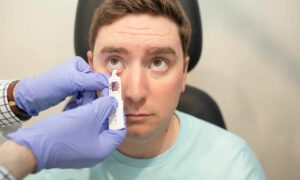
Dr. Miller (left) and her practice team. Dr. Miller said that how you present yourself to patients and peers can have a significant impact on you are perceived and the professional opportunities that will open to you.
By Pamela Miller, OD, FAAO, JD, FNAP
March 15, 2023
Professionalism in how you present yourself, and the boundaries and expectations you set with others, is not always easy to achieve. Here is how to put forward an image and communicate with others in a way that makes being treated with respect, and generating greater career opportunities, more likely.
Model the Behavior You Want Reflected Back to You
Decades ago, I served on several state and national optometric boards where I was the only female. On one occasion, one of our female legislative lobbyists came to me to complain that a fellow board member was making off-color jokes to her. She was shocked and horrified, yet it turned out she was regularly going out drinking with several of the board members and her language when telling jokes was equal to theirs (and even worse, according to some).
Another female lobbyist would often pick “lint” off the jackets of the male board members, an act that bordered on inappropriate or offensive, yet was never rebuffed by the men as being too familiar. Of course, this was a time in our history where women were a big minority and often not treated equally or respectfully and I was young and new to the profession, so it was not a good idea to make too many waves.
By contrast, I simply did not go to bars with my fellow board members, and I maintained appropriate personal space when interacting with them. Not surprisingly, I didn’t have an issue with jokes I found offensive being told to me. In short, I didn’t “hang out” with them. When a problem did arise, I was able to handle it more effectively, even enlisting the assistance of a senior member or administrator.
If you have an expectation of being treated in a particular way, you have to treat others in that same way. Sometimes, even when you treat others as you wish to be treated, and maintain a proper professional distance, you still will encounter uncomfortable exchanges. However, more often than not, your behavior will be reflected back to you. Of course, experience enables you to address uncomfortable situations more easily, as you become more certain of yourself.
Enforce Your Office’s Rules & Standards
The behavior of people in the world as a whole is outside of your control. In your own office, however, you are able to set rules and standards. If you don’t enforce those rules and standards, you are asking for violators to respect you less. And yes, you will be tested to see if you are really serious.
We still require all who enter our office to wear masks. Recently, a deacon from a nearby church, who was a previous patient, came in and refused to wear a mask. He said he wouldn’t because he didn’t have to. Our staff gave him a mask and he said he didn’t know how to use it. He ripped it up, wadded up the pieces and stormed out of the office. A short time later, he returned, wearing a mask, but ranting and raving in front of my staff and other patients with their children. I told him, “Deacon, I think our time together has come to an end. I do not wish to see you again in my office. Please do not come back into my office, ever.”
If I had given into this patient’s anger, and allowed him to violate the rules of our office, he would have learned that my rules and standards as a professional can be disregarded with no consequences. It also showed my other patients that this was unacceptable behavior and would not be tolerated.
Communicate How You Would Like to Be Addressed
When I started my career, there were few women optometrists, or female doctors in general. One of my first patients said to me, “So, babe, how are you doing today?” I replied, “That’s Dr. Babe.” I was able to use humor to make an important correction without causing undue discomfort. Back then, it was a matter of education because this patient had probably never encountered a female doctor, and didn’t know how to interact with me.
In our current era, in which nearly half or more of practicing optometrists are female, it’s appropriate to simply let a person addressing you unprofessionally to know that you are “Dr. X.” In my office, I am known as “Dr. Pam.” This is a compromise that communicates the ease and friendliness of our office, while maintaining the respect due their doctor.
Your patients will generally address you in the same way you introduce yourself, and in the same way your staff refers to you. I always introduce myself to patients as “Dr. Pam,” and when a patient has a professional designation, I will use that when addressing them, acknowledging that they also deserve respect.
Other Articles to Explore
Keep Conversation with Patients Focused on Their Care
In my practice, it is not unusual to have patients who tell us they were just released from prison. It would be understandable if the doctor began the conversation, “Wow! What did you do to get in there?”
My approach instead is to ask questions that relate to their lifestyle, so I can get them the care they need. For example, I might respond, “Oh, that’s great! Are you back to work at all? How much time are you on your computer and/or phone?”
If a patient tells me they’re a musician, I would ask: “What instrument(s) do you play? Are you in a band or an orchestra? Do you use a music stand? Do you also compose?”
When caring for a truck driver, “Are you driving a big rig? Do you drive mostly at night?”
The conversation should always be steered back to questions that give you the information that enables you to provide the services and products they need.
Communicate the Professionalism of Your Staff
I believe in giving staff credit in front of patients for providing quality care and service, and never criticizing or correcting staff in front of patients.
If a patient thanks me for squeezing them in, I might say: “You need to thank Denise. She’s the one who made that decision and got you in.”
I also highlight the knowledge of my staff. If my patient asks me how much a particular frame is, I may respond, “I don’t know, but Effie can help you. She will make sure you have the right information.”
All in all, it is important to acknowledge everyone in the office as being valuable and important, starting with your patients and staff members. They are the ones who help make you successful and they need to be recognized by you. Model the behavior you want reflected back to you when dealing with everyone to ensure your success.
 Pamela Miller, OD, FAAO, JD, DPNAP, has a solo optometric practice in Highland, Calif. She holds a law degree and a therapeutic license, is California State Board-certified and glaucoma-certified to prescribe eye medications, and offers comprehensive vision care, contact lenses, visual therapy and low vision services. To contact her: drpam@omnivision.com.
Pamela Miller, OD, FAAO, JD, DPNAP, has a solo optometric practice in Highland, Calif. She holds a law degree and a therapeutic license, is California State Board-certified and glaucoma-certified to prescribe eye medications, and offers comprehensive vision care, contact lenses, visual therapy and low vision services. To contact her: drpam@omnivision.com.

























